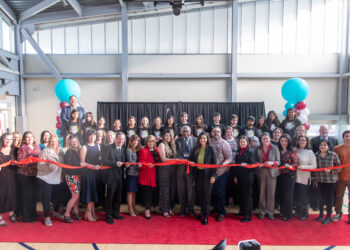‘CORE’ Strength: $1 Million Fuels New Property Management Training at Chaffey College

Call it a new lease on life.
A brand-new workforce development initiative will soon give low-income residents in-demand property management skills. Chaffey College’s “CORE Academy” certificate program is set to launch next year, thanks to $1 million in state funding secured by Assembly Member James Ramos.
“Our state is facing historic challenges resulting from the economic devastation caused by the pandemic,” says Ramos in a recent press release. “Workforce development programs like the CORE Academy are key to creating true economic mobility, and I’m proud to be part of this partnership.”
Industry partner Greg Bradbard concurs. According to the Senior Vice President for National Community Renaissance (National CORE), the development is truly a cause for celebration. “We’re pretty excited about it,” he says. “This is something that National CORE has envisioned for several years.”
The synergy first began in 2019 when National CORE, one of the nation’s largest nonprofit developers of award-winning affordable housing, sought help from Chaffey College.
“They came to us with a problem,” recalls Associate Superintendent of Instruction and Institutional Effectiveness Laura Hope. “They have a lot of properties and a shortage of property managers… They felt we could work with them to develop a program.”
Because there is no national certification or curriculum for property management, the partners looked at National CORE’s workforce needs along with labor statistics. They realized that an innovative training program like CORE Academy would not only break new ground but also launch careers while fulfilling staggering demand.
“Across Southern California and beyond, there’s a great, ongoing need for individuals to enter the property management industry,” explains Bradbard. From apartment communities to multifamily properties, he says that there are never enough leasing agents, maintenance workers and service managers.
“Just at National CORE alone, at any given time, we have 30-plus job openings that are waiting to be filled,” says the senior VP. “We know that’s true of many other property management companies and apartment owners throughout Southern California.”
For Hope, the partnership was natural.
“Looking at the local labor market projections, this particular area has an anticipated growth rate of 43 percent over the next five years,” says the superintendent. “We see so much potential for our students to build toward a better life.”
While program development slowed during the pandemic, the partners powered through the past six months, gaining the support of business partners, other nonprofits and legislators. The rest is history: The funding for CORE Academy was included in Assembly Bill 132 and signed into law by Governor Gavin Newsom on July 27. Says Bradbard, “We were fortunate that Assembly Member James Ramos stepped up and was able to secure this appropriation for us.”
Now, the program is taking shape out of existing real estate, marketing, bookkeeping and human resource courses. Since the program is non-credit, it will be tuition-free, making it accessible to low-income participants. Students can complete the program in just one year and earn a workforce certificate recognized by the California Community Colleges Chancellor’s Office.
The short-term training offers all the skills workers need at National CORE and other property management companies, where employees can earn an average of $22-25 per hour.
“National CORE is not only looking to help underprivileged people, but they’re also providing education and a supportive environment so that people can better find their way out of poverty,” says Hope. Because the academy’s initiation process was just approved in September, she explains, the goal is to start offering the courses as soon as late spring or early summer.
“It will include both classroom-based and hands-on training,” says Bradbard. Students will learn skills that can lead to a job right away. Meanwhile, the training could also feed into further certifications to boost knowledge along with paychecks.
“If they desire to keep going with their education, they could add additional classes that will allow them to get their associate degree,” says the VP. “That will prepare them for upward mobility.”
Students will learn how to market vacancies and develop brand recognition for companies, in addition to performing renter’s bookkeeping for both market-rate and subsidized housing. The program will also cover the management of maintenance workers and subcontractors, as well as real estate principles and property regulations, such as ADA access and safety requirements. As Hope says, “It really runs the gamut of a lot of fundamental skills around property.”
The non-credit certificate in property management can lead to other educational pathways as well. Students could earn an associate in facilities management, a transfer program articulated with California State University, San Bernardino, which could lead all the way to a master’s degree. Other potential avenues include marketing, real estate and human resources.
“It’s a really great starting point for someone to earn a living and create a very clear pathway out of poverty,” says Hope. “I don’t think it will be long before it fills the classroom.”
Courses will be open to the community and marketed to the subsidized housing residents at National CORE, where many potential employees are interested in getting started. The nonprofit also hopes to reach out to younger residents, such as teens just graduating from high school and young adults who haven’t yet determined a career path. “This is a great opportunity…to help them increase their income,” says Bradbard.
Long-term plans include building an internship component into the program. And because National CORE runs 32 affordable apartment communities across the Inland Empire, each containing between 60 to 300 apartments, it can provide the perfect practical training ground.
“We could place students in an internship for them to get hands-on work experience, where they’re working right beside a community manager,” says Bradbard.
But the partners don’t plan to stop there. They also hope to build relationships with other apartment owners and multi-property management companies. According to Bradbard, “We could place those students into jobs with those other companies right out of the program.”
The possibilities are endless, and Chaffey College is looking forward to launching its first CORE Academy shortly.
According to Hope, “There’s a great synergy between what National CORE represents and what Chaffey represents in terms of improving the standard of living for our community.”




